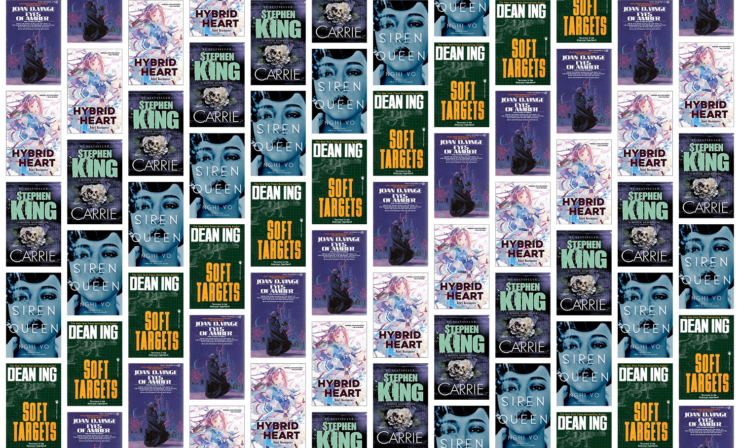Modern life in developed and developing countries might be said to be defined by mass media. Our knowledge of and views of events are inescapably shaped by the way mass media packages them—by methods that are often hidden from public awareness. Authors have been concerned about the implications of this process for many decades. Or at least interested enough in the media landscape to use it in settings and plots. The result: many different tales, some of which are quite entertaining.
Don’t believe me? Here are five such works.
Carrie by Stephen King (1974)
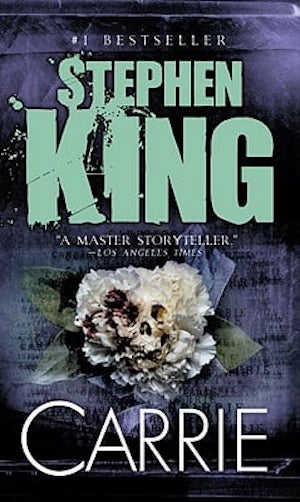
Carrie White serves a valuable need at Chamberlain’s Ewen High School. She is a person one can persecute. Phys Ed teacher Desjardin’s intervention on Carrie’s behalf upsets the natural order. Fellow student Sue Snell’s belated, guilty efforts to befriend Carrie are a further deviation. It falls to mean girl Chris Hargensen and boyfriend Tommy to restore normalcy by humiliating Carrie at the prom.
Chris and Tommy’s project does not take into account that Carrie is a prodigiously powerful telekinetic. Although the nasty duo succeed in dousing Carrie in pig’s blood at the prom, the results are less than amusing. An infuriated Carrie telekinetically slaughters her schoolmates and many Chamberlain residents. Quite a lesson in the downside of bullying.
Unlike the 1976 Brian de Palma film adaptation, King’s novel foreshadows Carrie’s murder spree with excerpts from the articles and books that followed the destruction of the town of Chamberlain. All along, the reader knows (or thinks they know) what happened at Carrie’s prom. It gradually becomes clear that news reports and bloviating pundits paint an inaccurate picture of events, one that will no doubt become official history. It is an aspect of the novel that took me by surprise when I reread it.
“Media Man” by Joan D. Vinge (1976)
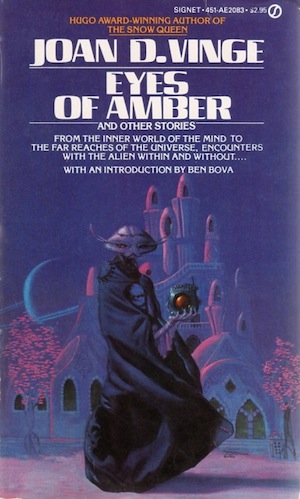
Chaim Dartagnan is a Media Man, a paid shill for Demarchy plutocrats. Current task? Accompany Demarch Siamang and spaceship pilot Mythili Fukinuki on a rescue mission to Planet Two. Keenly aware he is lucky to have a job at all, given the deplorable and declining state of the Heaven system economy after the Civil War, Chaim does a masterful job of tolerating Siamang’s abusive management style.
Chaim’s tolerance proves useful when Siamang murders the man the mission was sent to rescue. Confronting a known killer sounds like an excellent way to become the next victim. Chaim’s solution is to avidly bootlick in an attempt to stay alive. Mythili takes a more judgmental view of the killing. This makes her inconvenient to Siamang. Unfortunately for Chaim, he’s fond of the pilot. Balancing affection with self-preservation may be impossible.
As I recall the notes that accompanied this story (which I read in the collection Eyes of Amber), Vinge was inspired by murder mysteries in which well-meaning witnesses confront murderer with their crimes before going to the police. Characters who want to live to the end credits should avoid such life choices.
Soft Targets by Dean Ing (1979)
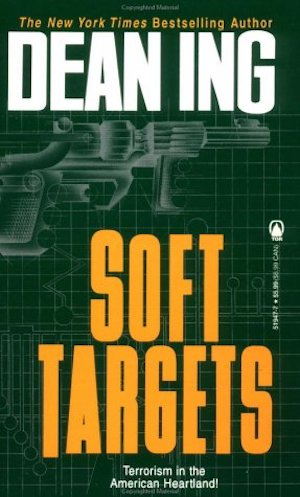
Hakim Arif is a bold visionary who sees in American unpreparedness an opportunity to convince many of the world’s terrorist movements to cooperate on a campaign of mass carnage. Arif, as the coordinator of this campaign, hopes for fame, glory, and wealth. This will require widespread news coverage, which Arif believes should be easy to arrange. After all, if it bleeds, it leads.
The terrorists make an enormous mistake in targeting journalists. Journalists, now victims, are no longer neutral reporters. Inspired by comedian Charlie George, they deploy a weapon Arif did not expect: ridicule. Why inspire a fear of terrorists, asks the comedian, when instead terrorists could be portrayed as laughable fools? This bold proposal threatens Arif’s bottom line, which is (for him) an unforgivable sin.
Ing’s contemporaries often took a very negative view of journalists. Ing in contrast provides a bevy of mass media types doing their best to do the right thing, including what may be SF’s most heroic Walter Cronkite expy.
Siren Queen by Nghi Vo (2022)
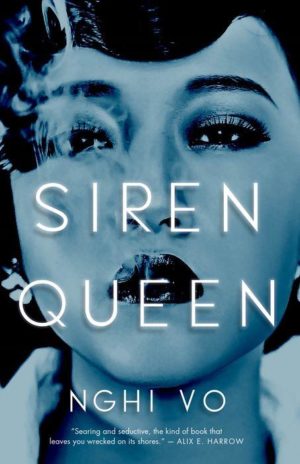
Beguiled by the silver screen, the woman the world will know as Luli Wei is determined to become a movie star. Ambition alone will not be sufficient. Luli is fortunate enough to have a mentor to protect her from the hazards of her career; she is also canny enough to discard him when a better opportunity comes along. Will that be enough or will Luli be typecast and discarded like so many other stars? Or will she suffer a far worse fate?
Oddly, even though this is a period-piece fantasy in which human sacrifice is an acceptable cost of doing business, the range of possible outcomes for aspiring entertainers doesn’t seem markedly worse than it is in our universe. It’s a good thing that would-be actors focus on the few success stories or it might be hard to recruit them.
Hybrid Heart by Iori Kusano (2023)

Determined to remain an Idol, Rei is keenly aware her synthetic rivals—Advanced Media Creation Girls—effortlessly meet inhuman standards of beauty, comportment, and obedience. Having sacrificed so much to become the focus of adoration for millions, Rei can see no other path but to do whatever it takes to force herself into a mold into which no human can fit. To do otherwise would be to admit she has wasted her life on an ephemeral, destructive dream.
Why are the simulated and real Idols always referred to as girls, regardless of the fact that they are ageless androids? To quote a supporting character, “People say ‘girl’ when they want a polite euphemism for ‘disposable.’” Nothing done to Rei in this novel is unrealistic, except that more advanced versions of Hatsune Miku exist and her manager has access to as yet uninvented technology to monitor and micromanage Rei’s life.
***
Of course, this review barely scratches the surface of this subject, not least because I’ve never read Transmetropolitan and I couldn’t work out how to cram in a gratuitous reference to Hunter S. Thompson, not even by involving his avatar in Doonesbury. If the list above overlooks some of your favourite examples, please do mention them in comments, which are, as ever, below.
In the words of fanfiction author Musty181, four-time Hugo finalist, prolific book reviewer, and perennial Darwin Award nominee James Davis Nicoll “looks like a default mii with glasses.” His work has appeared in Interzone, Publishers Weekly and Romantic Times as well as on his own websites, James Nicoll Reviews (where he is assisted by editor Karen Lofstrom and web person Adrienne L. Travis) and the 2021 and 2022 Aurora Award finalist Young People Read Old SFF (where he is assisted by web person Adrienne L. Travis). His Patreon can be found here.










